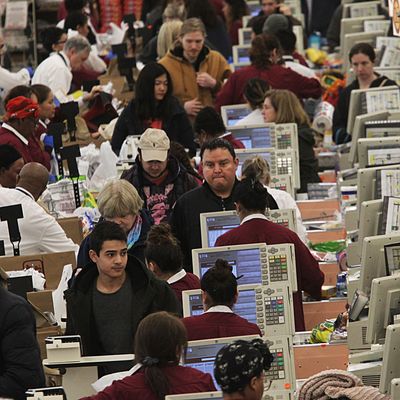
Grocery-store workers in Vermont and Minnesota will shortly be classified as emergency employees, Mother Jones reported on Thursday. They’ll occupy the same tier, legally, as first responders, and will be eligible for benefits they currently lack, including child care. The move recognizes the role that cashiers, stockers, and others play by maintaining the nation’s access to food. With the novel coronavirus stoking panic and now driving people indoors, grocery-store workers have endured long hours and angry hoarders on top of their usual precarity.
This new classification will grant these workers some relief, and recognizes the risks they’re facing by going to work. But it also highlights the arbitrary character of the labels we apply to labor. So too do the lockdown procedures of several states, including New York’s, which categorize grocery-store workers as essential labor. The outbreak of the novel coronavirus should debunk at last the idea that low-wage labor is less essential than other kinds of work. The categories of essential versus nonessential — or skilled versus unskilled labor — were never as clear as their common usage implied. As the pandemic rearranges American life, possibly for good, it should also force a reckoning. The way we think about labor and work has to change.
Since the virus reached the U.S., grocery-store workers, delivery drivers, Amazon warehouse workers, and others have taken on greater and greater burdens to keep society functional. They’ve received little from their employers in return. The U.S. does not guarantee anyone paid leave. A person’s ability to stay home when they’re ill, or to care for a child or a stricken relative, depends almost entirely on where they work. Salaried workers typically receive leave as part of a benefits package; unions bargain for stronger and more generous leave policies on behalf of their members, including a number of grocery-store workers.
But in the private sector, rates of union membership are low, and that means millions of Americans are vulnerable to the whims of whoever signs their paychecks. As the Washington Post reported on Thursday, 29 percent of private-sector workers lack sick leave overall. But that percentage is much higher in some industries, including hospitality and food service, and low-wage workers are especially unlikely to have paid leave. Many won’t be covered by the Families First Act now winding its way through Congress, either, which would still leave individual states with the responsibility to adequately protect workers.
While politicians debate, COVID-19 clarifies the realities of the American workforce. The pandemic illustrates at once the vulnerability and the necessity of low-wage workers. Panicked Americans depend on grocery-store workers to keep supplies stocked and readily available in a crisis. In a similar fashion, Amazon warehouse workers labor overtime to meet the needs of a population limiting its time outdoors. Amazon has made some concessions to reality, and is temporarily offering unlimited unpaid time off to hourly workers, including warehouse workers, and that all workers diagnosed with COVID-19 would receive two weeks paid leave. It also announced that it’s hiring 100,000 warehouse workers to help meet increased demands from housebound consumers. But Monica Moody, an Amazon warehouse worker and an activist with United for Respect, told Intelligencer on Monday that the company had barely implemented any safety precautions for workers. “They’ve given us Lysol wipes at our stations. They’ve posted two Purell towers with the sanitizer wipes in the break room, soon as you walk in,” she said. “It’s not like you have gloves, or that they’re handing out masks.” Days later, an Amazon warehouse in Queens reported its first case of COVID-19. Workers told The Atlantic that they weren’t informed of the event by the company, and that they were still expected to report for the night shift, both claims that Amazon denies.
Moody told Intelligencer at the time that she believed the company could do more to safeguard its vulnerable workforce. “You are a billionaire,” she said of Jeff Bezos, Amazon’s billionaire founder and CEO. “You have the funds to do this on a regular basis, especially if you can give out a $2 raise all of a sudden through the month of April. You can afford to give us paid sick time.” Instead, the company has set up a $25 million relief fund for destitute workers. It’s accepting donations, though Bezos could easily cover the entire cost on his own.
If companies won’t compensate workers for their essential work, elected officials will have to interfere. It should be obvious now, if it wasn’t before, that there’s no such thing as unskilled labor — that low-wage work is as essential and integral to daily life as the labor performed by accountants or lawyers. Low pay, few benefits, and no job security were realities of life for millions, well before COVID-19 existed. That inequality should end with the pandemic.






























